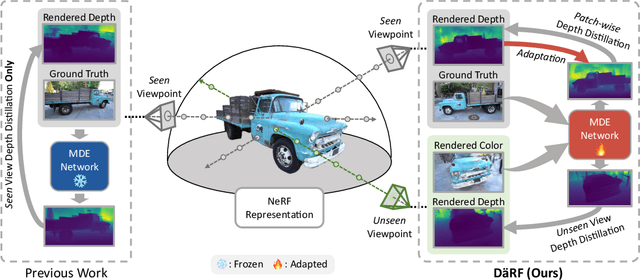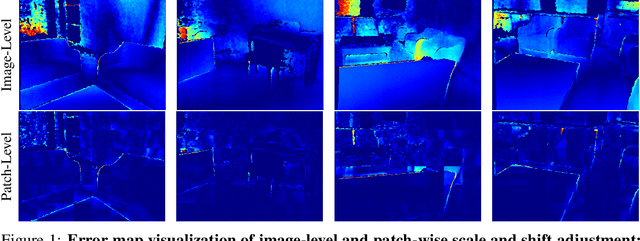Jiuhn Song
DäRF: Boosting Radiance Fields from Sparse Inputs with Monocular Depth Adaptation
May 30, 2023



Abstract:Neural radiance fields (NeRF) shows powerful performance in novel view synthesis and 3D geometry reconstruction, but it suffers from critical performance degradation when the number of known viewpoints is drastically reduced. Existing works attempt to overcome this problem by employing external priors, but their success is limited to certain types of scenes or datasets. Employing monocular depth estimation (MDE) networks, pretrained on large-scale RGB-D datasets, with powerful generalization capability would be a key to solving this problem: however, using MDE in conjunction with NeRF comes with a new set of challenges due to various ambiguity problems exhibited by monocular depths. In this light, we propose a novel framework, dubbed D\"aRF, that achieves robust NeRF reconstruction with a handful of real-world images by combining the strengths of NeRF and monocular depth estimation through online complementary training. Our framework imposes the MDE network's powerful geometry prior to NeRF representation at both seen and unseen viewpoints to enhance its robustness and coherence. In addition, we overcome the ambiguity problems of monocular depths through patch-wise scale-shift fitting and geometry distillation, which adapts the MDE network to produce depths aligned accurately with NeRF geometry. Experiments show our framework achieves state-of-the-art results both quantitatively and qualitatively, demonstrating consistent and reliable performance in both indoor and outdoor real-world datasets. Project page is available at https://ku-cvlab.github.io/DaRF/.
GeCoNeRF: Few-shot Neural Radiance Fields via Geometric Consistency
Jan 26, 2023



Abstract:We present a novel framework to regularize Neural Radiance Field (NeRF) in a few-shot setting with a geometry-aware consistency regularization. The proposed approach leverages a rendered depth map at unobserved viewpoint to warp sparse input images to the unobserved viewpoint and impose them as pseudo ground truths to facilitate learning of NeRF. By encouraging such geometry-aware consistency at a feature-level instead of using pixel-level reconstruction loss, we regularize the NeRF at semantic and structural levels while allowing for modeling view dependent radiance to account for color variations across viewpoints. We also propose an effective method to filter out erroneous warped solutions, along with training strategies to stabilize training during optimization. We show that our model achieves competitive results compared to state-of-the-art few-shot NeRF models. Project page is available at https://ku-cvlab.github.io/GeCoNeRF/.
 Add to Chrome
Add to Chrome Add to Firefox
Add to Firefox Add to Edge
Add to Edge